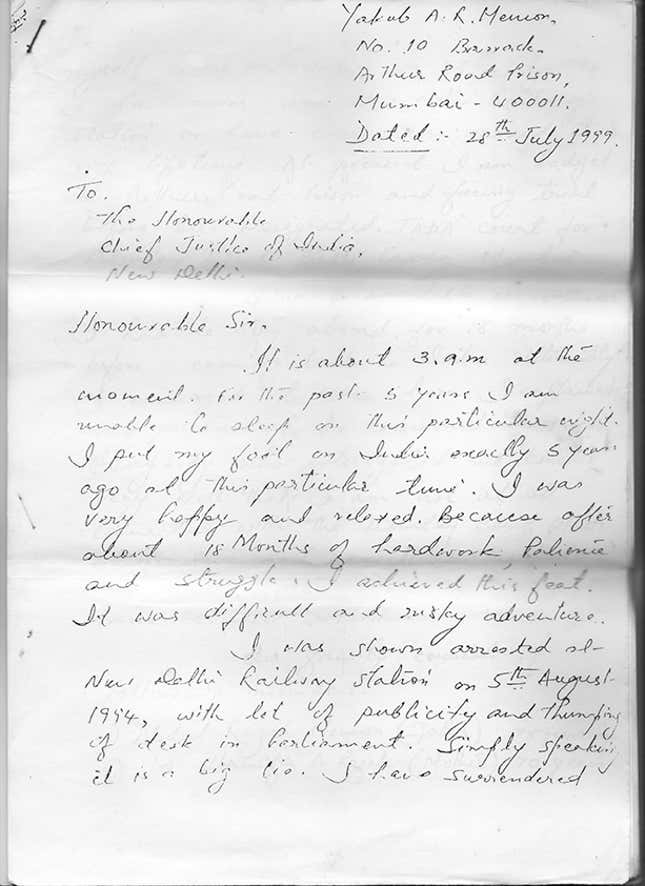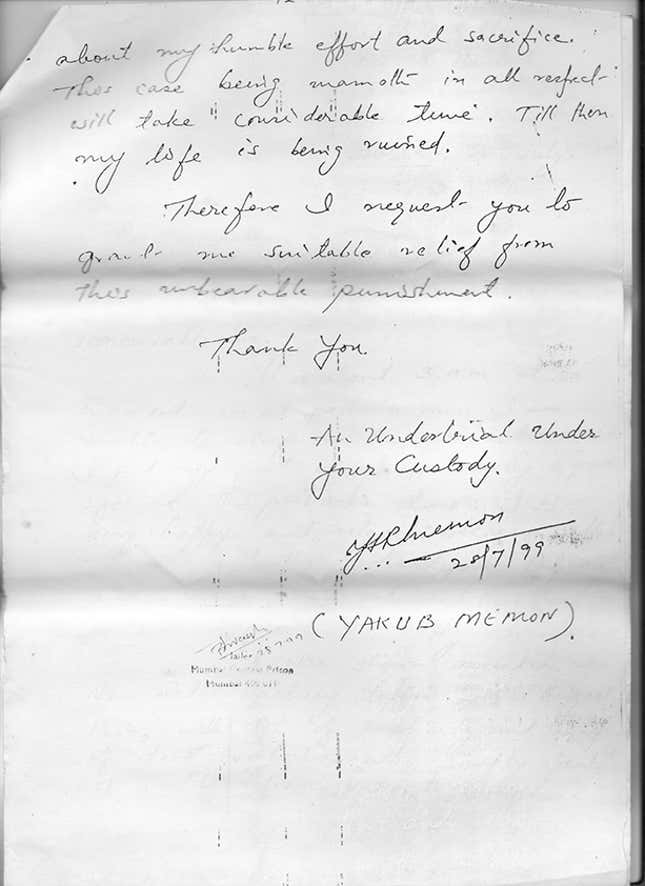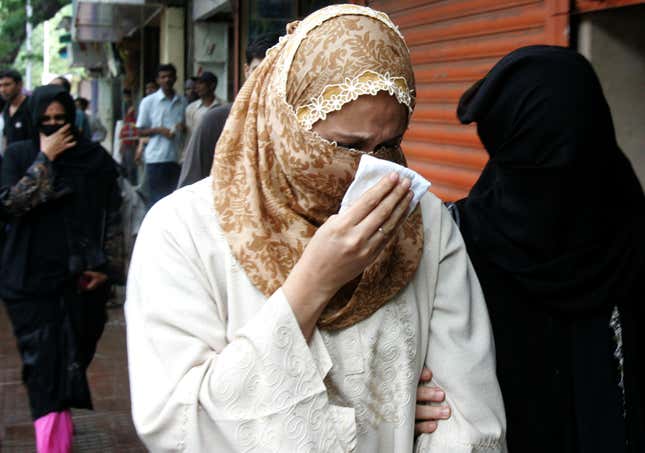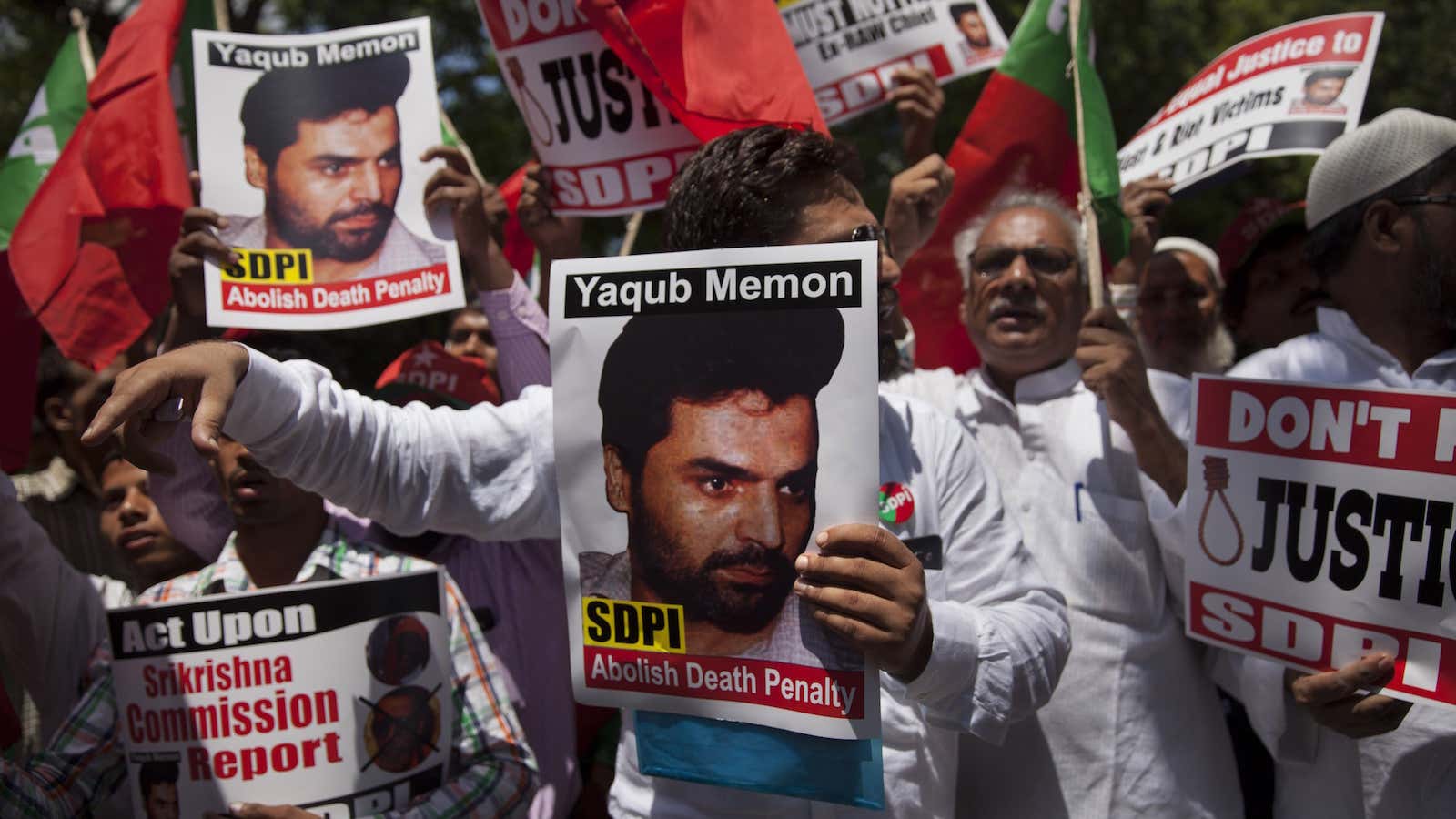This post has been updated.
In 1993, Bombay, now Mumbai, was rattled by a series of bomb blasts.
It was one of the deadliest attacks on the financial capital of India, killing more than 250 people and injuring 713. The attacks were allegedly planned and carried out by one of the country’s most wanted men, Dawood Ibrahim, and his accomplice Tiger Memon to avenge Muslim deaths during the Hindu-Muslim riots that had rocked the city a few months earlier.
In the 22 years since, 129 people were accused and a 100 were convicted for the attack.
Yakub Abdul Razak Memon, a chartered accountant and the younger brother of Tiger Memon, was hanged on July 30, after India’s president rejected a mercy plea and the country’s supreme court dismissed a curative petition—a final recourse for challenging a supreme court verdict—submitted by Yakub on July 21.
Other members of the Memon family, including Yakub’s brothers, Yusuf and Essa, and sister-in-law Rubina, were also arrested and are serving their sentences. Their elder brother, Tiger Memon is still in Pakistan while the Indian government has no clue about the whereabouts of Dawood Ibrahim.
Here is a timeline of how it all began and how the trial unfolded:
December 1992: Babri Masjid, a 464-year-old mosque in Ayodhya, is demolished by right-wing Hindu groups. Riots break out between Hindus and Muslims across India. More than 900 people, mostly Muslims, are killed in Mumbai.
March 1993: Thirteen blasts take place in Mumbai. Among the prime targets of the attack are the Bombay Stock Exchange building, the Air India headquarters in south Mumbai and the Sahar International airport. The blasts are found to be the handiwork of Dawood Ibrahim and much of the planning for the attacks was done by the Memon family at their house in south Mumbai, according to the police.
Days before the blasts, members of the Memon family flew out to Dubai and later to Karachi.
Two days after the attack, police find an abandoned Maruti van with AK-56 rifles and hand grenades. The ownership of the vehicle is traced to Yakub’s sister-in-law, Rubina. Yakub, the most-educated person in the Memon household, is accused of being behind the attacks.
A subsequent search at the Memon house leads to the recovery of the ignition key of the scooters that were used for carrying out the attacks.
April 1994: Yakub is arrested from New Delhi while his wife claims that he surrendered.
“We returned because we were living under house arrest in Karachi,” Yakub’s wife Raheen told the Times Of India in 2007. ”We didn’t like it there—we were missing our homeland.”
August 1994: Here is the only interview given by Yakub while he was in custody.
July 1999: Yakub writes to India’s supreme court seeking relief from the case. In his letter, he says he voluntarily returned to India.


September 2001: Yakub is allowed some time out of jail after his father Abdul Razak Memon dies. This is the only time he is let out since 1994.
July 2007: Justice Pramod Kode in the Terrorist and Disruptive Acts (TADA) court sentences Yakub to death. After the sentence is pronounced, Yakub screams in the courtroom, saying, “O my Lord, forgive this man. He knows not what he does!”
Yakub had already been in jail for 13 years.
July 2009: Yakub seeks the Bombay high court’s consent to spend time with his family inside the prison. However, the plea is rejected and the high court rules that family meetings can take place only inside the prison’s metal-barricaded interview room. Memon’s daughter was born a month after he was arrested and he had not spent any time with her.
March 2013: On March 21, the supreme court of India upholds Yakub’s death sentence and says that he was the mastermind behind the attacks. In the same year, he is awarded a Master’s degree in English literature by the Indira Gandhi National Open University.

October 2013: Yakub files for a presidential pardon.
May 2014: India’s president Pranab Mukherjee rejects Yakub’s mercy petition.
September 2014: The supreme court stays Yakub’s execution and issues a notice to the Maharashtra government after he files a plea seeking an open court hearing of his petition for a review of the verdict.
December 2014: The supreme court issues notices to the Central Bureau of Investigation and the Maharashtra government on the review petition filed by Yakub. It also extends the stay.
April 2015: On April 10, the supreme court confirms Yakub’s death penalty and rejects his plea for reconsidering the verdict.
July 15, 2015: Media reports, quoting government officials, say Yakub will be hanged on July 30. “The supreme court has made a decision on this issue,” Devendra Fadnavis, chief minister of Maharashtra, says.
“Whatever directives will be given by the court, the Maharashtra government will act according to that. We will provide more information on this matter when the time is right.”
July 21, 2015: India’s supreme court dismisses the curative petition filed by Yakub. He then files another mercy plea.
July 28, 2015: Two judges of the supreme court disagree on Yakub’s plea seeking a stay on his execution and refer the matter to the chief justice. “It has been noticed that the procedure by law was not followed in this case while depriving the right to life of a person,” justice Kurian Joseph, one of the two judges says, while staying the death warrant. The supreme court subsequently set up a three-bench panel to decide on the plea.
July 29, 2015: The supreme court decides to uphold the death warrant issued by the TADA court in 2007. Yakub’s lawyers submit another mercy plea to Maharashtra governor and India’s president. Both are rejected by the end of the day.
July 30, 2015: Yakub challenges the rejection of his mercy plea by the president. Memon’s lawyers argue that he can’t be hanged for at least 14 days once his mercy plea was rejected. The supreme court hears the matter at 3 AM and dismisses the plea. Memon is hanged at 6.30 AM on July 30—his 54th birthday—at the Nagpur central jail.
